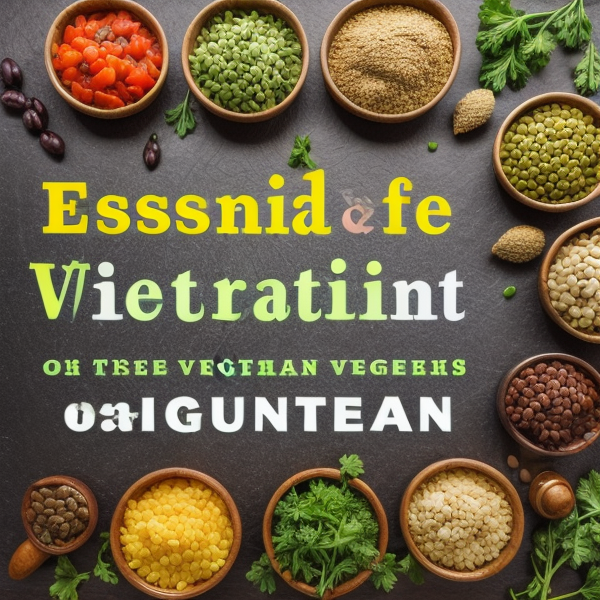Sources of Essential Vitamins and Minerals for Vegans and Vegetarians

Title: Sources of Essential Vitamins and Minerals for Vegans and Vegetarians
Introduction:
Being a vegan or vegetarian can sometimes make it challenging to get all the essential nutrients your body needs. However, with careful planning and knowledge of which foods provide these vital vitamins and minerals, you can easily meet your daily requirements while enjoying a healthy plant-based diet. In this article, we’ll explore some of the best sources of essential vitamins and minerals for vegans and vegetarians.
Vitamin B12:
Vitamin B12 is an important water-soluble vitamin that plays a crucial role in red blood cell formation, DNA synthesis, and neurological function. It is primarily found in animal products such as meat, fish, eggs, and dairy. For vegans and vegetarians, fortified foods are the best source of vitamin B12. Some examples include:
* Fortified breakfast cereals
* Nutritional yeast (a popular ingredient in vegan cooking)
* Soy milk and other plant-based milks fortified with B12
Iron:
Iron is another essential nutrient that can be difficult to obtain on a vegan or vegetarian diet. Iron helps transport oxygen throughout the body and is found in both plant-based and animal-based foods. Heme iron, which is more readily absorbed by the body, is found in animal products, while non-heme iron is found in plants. To increase the bioavailability of non-heme iron, pair it with vitamin C-rich foods such as citrus fruits, tomatoes, bell peppers, and leafy greens. Good sources of iron for vegans and vegetarians include:
* Tofu, tempeh, and other soy products
* Lentils, chickpeas, and other legumes
* Spinach and other dark leafy greens
* Quinoa and other whole grains
Calcium:
Calcium is essential for strong bones and teeth and plays a role in muscle contraction, nerve transmission, and blood clotting. While dairy products are the most well-known source of calcium, there are plenty of plant-based alternatives. Some good sources of calcium for vegans and vegetarians include:
* Tofu, tempeh, and other soy products (calcium-set tofu, for example)
* Collard greens, kale, and other dark leafy greens
* Almonds, sesame seeds, and other nuts and seeds
* Calcium-fortified plant-based milk (such as almond, soy, and rice milk)
Omega-3 Fatty Acids:
Omega-3 fatty acids are essential polyunsaturated fats that play a crucial role in heart health, brain function, and inflammation. They are found in fatty fish such as salmon, tuna, and mackerel, as well as in certain plant-based foods. For vegans and vegetarians, algae and flaxseeds are excellent sources of omega-3s. Other good sources include:
* Walnuts and other nuts and seeds
* Chia seeds
* Canola oil
Vitamin D:
Vitamin D is a fat-soluble vitamin that is essential for maintaining strong bones and teeth, supporting immune function, and reducing inflammation. It is produced when skin is exposed to sunlight, but it can also be obtained through dietary sources. Some good sources of vitamin D for vegans and vegetarians include:
* Mushrooms exposed to ultraviolet light
* Fortified plant-based milk (such as almond, soy, and rice milk)
* Fortified cereals
Vitamin E:
Vitamin E is an antioxidant that protects cells from damage and plays a role in immune function, skin health, and eye health. It is found in many plant-based foods, including:
* Nuts and seeds (especially almonds, sunflower seeds, and hazelnuts)
* Avocado
* Sweet potato
* Spinach and other leafy greens
Zinc:
Zinc is an essential mineral that supports immune function, wound healing, and growth and development during pregnancy, childhood, and adolescence. It is found in both plant-based and animal-based foods. Some good sources of zinc for vegans and vegetarians include:
* Tofu, tempeh, and other soy products
* Nuts and seeds (especially pumpkin seeds, squash seeds, and chia seeds)
* Whole grains (such as brown rice, quinoa, and amaranth)
Conclusion:
By incorporating these essential vitamins and minerals into their diets, vegans and vegetarians can ensure they are meeting their daily nutritional needs and living a healthy lifestyle. With careful planning and knowledge of which foods provide these vital nutrients, it is easy to create delicious and nutritious meals that support overall health and wellness.
